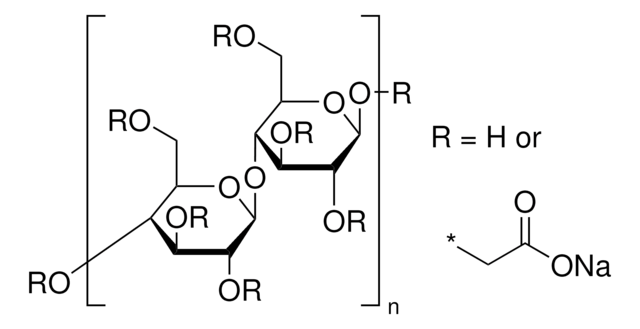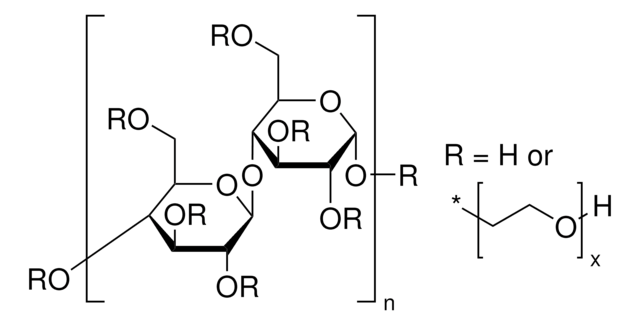419338
Sodium carboxymethyl cellulose
average Mw ~700,000
Synonym(s):
Carboxymethylcellulose sodium salt
Sign Into View Organizational & Contract Pricing
All Photos(3)
About This Item
Recommended Products
form
powder
Quality Level
autoignition temp.
698 °F
mol wt
average Mw ~700,000
extent of labeling
0.9 carboxymethyl groups per anhydroglucose unit
mp
270 °C (dec.)
SMILES string
[Na].OC(C(O)C(O)C=O)C(O)CO.OC(=O)C
InChI
1S/C6H12O6.C2H4O2.Na/c7-1-3(9)5(11)6(12)4(10)2-8;1-2(3)4;/h1,3-6,8-12H,2H2;1H3,(H,3,4);
InChI key
DPXJVFZANSGRMM-UHFFFAOYSA-N
Looking for similar products? Visit Product Comparison Guide
General description
Sodium carboxymethyl cellulose (CMC) is a water dispersible sodium salt of carboxy-methyl ether of cellulose that forms a clear colloidal solution. It is a hygroscopic material that has the ability to absorb more than 50% of water at high humidity. It is also a natural polymeric derivative that can be used in detergents, food and textile industries.
Application
CMC can be used as a binder in the preparation of graphene nano-platelet based inks for the fabrication of dye sensitized solar cells (DSSCs). It can also be used as a viscosity enhancer in the development of tyrosinase based inks for the formation of electrodes for biosensor applications. CMC is used as a support material for a variety of cathodes and anodes for microbial fuel cells.
Storage Class Code
11 - Combustible Solids
WGK
WGK 1
Flash Point(F)
Not applicable
Flash Point(C)
Not applicable
Personal Protective Equipment
dust mask type N95 (US), Eyeshields, Gloves
Choose from one of the most recent versions:
Already Own This Product?
Find documentation for the products that you have recently purchased in the Document Library.
Customers Also Viewed
Amélie Béduer et al.
Advanced healthcare materials, 4(2), 301-312 (2014-09-03)
Millimeter to centimeter-sized injectable neural scaffolds based on macroporous cryogels are presented. The polymer-scaffolds are made from alginate and carboxymethyl-cellulose by a novel simple one-pot cryosynthesis. They allow surgical sterility by means of autoclaving, and present native laminin as an
Tian Carey et al.
Nature communications, 8(1), 1202-1202 (2017-11-02)
Fully printed wearable electronics based on two-dimensional (2D) material heterojunction structures also known as heterostructures, such as field-effect transistors, require robust and reproducible printed multi-layer stacks consisting of active channel, dielectric and conductive contact layers. Solution processing of graphite and other
Radiation preparation and swelling behavior of sodium carboxymethyl cellulose hydrogels
Liu P, et al.
Radiation Physics and Chemistry, 63(3-6), 525-528 (2002)
Heleen M de Vogel-van den Bosch et al.
BMC genomics, 9, 231-231 (2008-05-21)
The selective absorption of nutrients and other food constituents in the small intestine is mediated by a group of transport proteins and metabolic enzymes, often collectively called 'intestinal barrier proteins'. An important receptor that mediates the effects of dietary lipids
Richard P G Ten Broek et al.
Lancet (London, England), 383(9911), 48-59 (2013-10-01)
Formation of adhesions after peritoneal surgery results in high morbidity. Barriers to prevent adhesion are seldom applied, despite their ability to reduce the severity of adhesion formation. We evaluated the benefits and harms of four adhesion barriers that have been
Our team of scientists has experience in all areas of research including Life Science, Material Science, Chemical Synthesis, Chromatography, Analytical and many others.
Contact Technical Service
![Poly[(o-cresyl glycidyl ether)-co-formaldehyde] average Mn ~870](/deepweb/assets/sigmaaldrich/product/structures/492/686/3e332037-f67b-49a2-8326-268fc7b0b900/640/3e332037-f67b-49a2-8326-268fc7b0b900.png)


